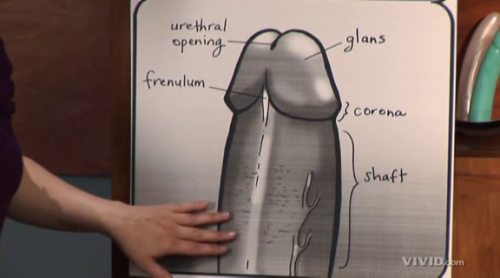#intactivism
Photo 1 [source]
A photography student’s project: feminist phrase in response to rape culture.
Photo 2 [source]
A baby t-shirt design created by a Intactivist mother.
I’m just going to juxtapoze these two separate messages into one post.
Hey! Two things with the same words! But for completely different reasons! But yet for the same reasons? Dare I say these two things can exist in an overarching theme together? Might it be possible that our culture has some broad issues we have yet to answer, which put these two things into a category?
It’s the removal of choice, it’s the absence of a clearly defined aspects of consent. It’s listening to victims, hearing their stories, and understanding they have had a choice taken away from them. This is happening in the same culture, these issues..
Post link
Anatomy Meets Porn in all the right ways
This is a shot from “Tristan Taormino’s Expert Guide To Advanced Fellatio”. Another point for the porn industry. She covers not only the anatomy of the circumcised penis, but also the uncircumcised penis. She has people discuss their own personal experiences with both anatomy, and ephacises on facts. I can’t stress enough how wonderful it is that some porn directors are taking the time to set many things straight, that have not been discussed in classes effectively. This is a liberation, this the obliteration of censorship.
Also, this film is accessible, as you can see by the watermark. Sex-ed, and sex-positive culture is pushing forward and its coming from the same place the anti-porn feminists complain about: Porn. Adult films will never go away, they will only become more integrated into our culture, the way it was before America was indoctrinated by more extreme christian values and scared shitless by communism.
BAM education that helps via porn, the supposed dirt of society.
Further discussions about porn and the relevance to foreskins coming soon.
Post link
Nobody better take this blog *too* seriously.
Of course, nonconsentual surgery/partial amputation is unethical. That much doesn’t take a PhD to figure out. Be it the penis or a toe or an ear.
But cut men can experience equal depths of connection, love, and pleasure as anyone else. There is no true physical cap on joy that a person can endure. And we are all intact on the inside.
Questioning circumcision undermines the very foundation of our culturally-ascribed sense of masculinity. Coupled with the complex power dynamics it creates–its fertile territory for such S&M play as is described herein.
So, don’t take this blog too seriously. Take it just seriously enough.
Much love!Another example of the hypocrisy and blatant denial in the “intactivist” community….
Sorry, but “Of course, nonconsentual surgery/partial amputation is unethical” is debatable, unless of course you’d also advocate for letting a child perish when it required immediate intervention.
And no, saying that circumcision is unnecessary in comparison is not a counterargument. Clearly, nonconsentual surgery on infants or adults, namely infants, is not inherently unethical or immoral. Calling it unethical is an uneducated, ignorant assumption.
Part of the reason people may take your blog “too seriously” is because you take yourself too seriously, and absolutely refuse to entertain viewpoints contrary to yours, or accept them as credible.It doesn’t take a private discussion to learn that, but I most certainly did the hard way. You’re condescending, disrespectful, and have no regard for logic that challenges yours. You sooner accuse people have having various mental illnesses than consider the weight of their rationale.
And yes, I’ll be posting screenshots soon.
…That, and every single one of your posts directly berates, disrespects, insults, and shames circumcised men in a way that your portray as “truth” It’s no different from a racist calling blacks “niggers” and claiming to impart factual information, or truth.
You also inspire conflict between men who aren’t circumcised and men who are. Your sadistic game is only adding to the divide. Ever seen the arguments / animosity people have online, everywhere, on all social media platforms over this topic, namely men who were affected by the practice, and men who weren’t? Probably not, considering you made it extremely clear in out ‘talk’ that you’ve actually done very little research on this topic, like most “intactivists”, but it’s because they deal with stigmas people like you create.
It does not take a PhD or even a GED to discern that your blog is filled to the brim with hatred, and that so too is the entire “intactivist” (a.k.a. emotional terrorists, mental rapists, etc) community for its many,countless, similar discrepancies.
“Much love” doesn’t change the words you commit to. Endearing can coexist with malevolent. You might as well insult every minority and then sign off by telling people you “love them”.
Disturbing and unfortunate.
I totally agree.
Hypocrites like intactivists are probably the last people to decide what’s ethical and what’s not. Ethics should not be weaponized against peoples well-being.
The whole idea of making people ‘believe’ circumcision is harmful by spreading fake-news and shaming circumcised men, just so they can rely on them later, is probably more unethical then circumcision ever could be.
There are enough circumcised men who fall for their psyops and don’t do further debunking research on the topic, which then think they got ‘harmed’, even though they’re better off than most.
Intactivists then joyfully use the resulting anger for their cause.
The problem is that thinking they got ‘harmed’ is the factor that’s troubling people, and this thinking is independent of actual harm.
The whole intactivist movement is nothing but crude bullying made possible by the internet. Before then, parents happily granted their sons a circumcision when provided by healthcare and no one considered it as harmful.
There should be way more people opposing and protesting intactivism, and the best way to do so is proper enlightenment.
Post link
An intact man is one who has not been circumcised. Every man should be able to decide for himself if he wants part of his penis cut off by being circumcised. It is not the parents choice to cut off part of a baby boy’s penis.
Intactivists believe that men should choose for themselves.
Post link
Is the NHS carrying out thousands of unnecessary circumcisions on teenage boys? New report shows irreversible surgery is carried out 10,000 times per year
Is NHS carrying out thousands of unnecessary circumcisions on boys?
- Surgeons at Liverpool NHS trust say less invasive measures should be sought
- Official report claims more than half of annual circumcisions were unnecessary
- Up to half of boys undergoing procedure at some trusts were under age of five
Boys and young men are being circumcised unnecessarily by the NHS, risking sexual problems in later life, doctors at one of Britain’s leading children’s hospitals have warned.
Surgeons at Alder Hey Children’s NHS Trust, Liverpool, have criticised surgeons who offer the operation on medical grounds – suggesting they should be looking for less invasive alternatives.
In an official report, the hospital’s leading paediatric surgeon, Professor Simon Kenny, claims that more than half of the 9,500 circumcisions carried out for medical reasons each year in the UK should never have happened.
The analysis also found up to half of the boys who underwent medical circumcision at some trusts were under five, an age at which doctors agree the procedure is almost always unnecessary.
Prof Kenny, who is also NHS National Clinical Director for Children and Young People, declined to comment further when approached by The Mail on Sunday last week, but one of his colleagues told us: ‘There are a really large number of circumcisions happening in the UK, and often not for the right reasons.’
Circumcision – the removal of the foreskin, with a scalpel or other device – is offered on medical grounds if a boy has persistent problems such as discomfort and infections.
Left untreated, these can worsen, and even cause severe difficulties in later life.
But paediatric surgeon Rachel Harwood, who also works at Alder Hey, said: 'There are many other treatments out there for boys with foreskin issues that should be considered first.
'A circumcision is non-reversible, it’s a decision for life and many surgeons are effectively making that choice for parents when it’s not their decision to take.’
Child specialists at other hospitals have backed Alder Hey’s campaign and argue the problem is being driven by rural hospitals where there is a lack of surgeons who specialise in treating children.
'It relates to training and experience. If a surgeon hasn’t handled many cases they might be more likely to go for circumcision as it’s seen as the simple option,’ says Dr Chris Driver, consultant paediatric surgeon and urologist at Royal Aberdeen Children’s Hospital.
But not all doctors agree. Some argue that the alternative treatments are ineffective and, at worst, more harmful than circumcision.
In many cases, they say, circumcision is the only option for children who are in considerable pain.
The vast majority of medical circumcisions are to treat a condition known as phimosis, which is where the foreskin is too tight and cannot be pulled back.
This is normal in a newborn baby, but over time the foreskin loosens and can be pulled down more easily.
This why doctors say that circumcision should, in most cases, not be offered to under-fives.
But for some children the process can take longer and, according to NHS figures, half of all children under ten have phimosis.
By the age of 17, 99 per cent of phimosis cases will have resolved themselves, some studies suggest.
In almost all cases where phimosis continues past this age it is linked to an inflammatory skin condition called lichen sclerosus.
This can cause scar tissue to build up within the foreskin, making it shrink – and leading to phimosis.
While there are treatments that can help relieve lichen sclerosus, the scarring is irreversible, meaning circumcision is the only real option for patients.
'Most men still suffering from phimosis in adulthood have lichen sclerosus, and it is one of the only reasons you should perform a medical circumcision,’ says Vaibhav Modgil, a urologist at Manchester University NHS Foundation Trust.
In younger men and boys who do not have lichen sclerosis, treatments for phimosis include steroid creams, which given over several months can help soften the skin, and an operation known as a penile preputioplasty, in which only part of the foreskin is removed.
'There are many boys who do not suffer from lichen sclerosis who are having circumcisions,’ says Ms Harwood.
'By comparison, very few are having a penile preputioplasty, so we know there are surgeons who aren’t exploring the other options properly.’
Some doctors, however, believe that in many cases circumcision can be the only feasible option for children suffering from phimosis.
One reason is that steroid creams can be ineffective – an American study found a third of phimosis patients do not respond to them.
They also argue that penile preputioplasty is a complex operation and can cause further issues.
While this procedure can fix the phimosis, patients often report dissatisfaction at how their penis looks afterwards.
'Penile preputioplasty can be difficult to get right and it’s challenging to get an acceptable cosmetic result,’ says Dr Marc Lucky, a urologist at Liverpool University Hospitals NHS Foundation Trust.
And while many children’s phimosis will naturally resolve itself, doctors say teenagers who are in pain due to the condition should be considered for circumcision.
Phimosis can cause problems with hygiene, increasing the risk of a condition called balanitis in which the foreskin becomes inflamed, and other infections.
Paraphimosis, in which the foreskin gets retracted and cannot be returned to its original position, can also occur.
This can cut off blood supply to the penis and is considered serious if not remedied.
'If a child has these issues, particularly in their teenage years, then there’s a good argument that they might need circumcision,’ says Dr Lucky.
Nevertheless, doctors agree that circumcision is not a risk-free procedure. According to the British Association of Urological Surgeons, 'almost all patients’ will experience some permanent reduction in sensation in the penis.
This is because the skin that is removed, either using a scalpel or surgical scissors, contains several thousand nerve endings that transmit physical sensation to the brain.
A smaller number of men who undergo the procedure, which usually takes place under general anaesthetic, can experience more severe complications.
One in 50 will develop an infection or bleeding in the area.
While rare, oedema – a build-up of fluid in the skin – can occur, leading to dramatic swelling and deformity that can take many months to resolve.
In some cases, doctors say surgeons can remove too much foreskin, or not enough, which can lead to discomfort and pain later in life.
'Circumcision gets trivialised, but it’s only trivial when it goes well,’ says Mr Modgil.
He says he often sees men who underwent a medical circumcision at a young age, who complain of issues in the area as a result of the surgery.
'The foreskin grows and changes with age, so if you operate on it at a young age it’s hard to know what will happen to the skin later in life.
'It’s common for us to see men who’ve been circumcised for medical reasons at a young age who are in discomfort by their 20s or 30s.’
Ms Harwood says these issues can also affect boys mentally as they grow older.
'Some patients report a lack of sensation during sex, others experience mental health issues because they feel the decision to have surgery was taken away from them.’
In the UK, fewer than nine per cent of British males are circumcised, and the majority of these are either Muslim or Jewish, who are circumcised for religious reasons.
These operations are not typically carried out on the NHS.
Surveys suggest two per cent of men in the UK have been circumcised for medical reasons.
In America, however, more than three-quarters of men are circumcised, usually in infancy, and while rates have been falling in recent decades – currently fewer than 60 per cent of baby boys in the US undergo the surgery compared with nearly 80 per cent in the 1990s – it remains a much debated topic.
The American Academy of Pediatrics maintains that circumcision is beneficial, on medical grounds, because some studies suggest it reduces the risk of HIV infection, urinary tract infection and penile cancer.
But activist groups such as Intact America have called for an end to all but the most necessary medical circumcisions and a ban on religious circumcisions.
These activists, who often refer to themselves as 'intactivists’, argue that children are too young to consent to the procedure.
Medical circumcisions were, historically, more common in the UK than they are now, too. In 2000, more than 15 per cent of Britons were circumcised, according to the British National Survey of Sexual Attitudes and Lifestyles.
This means the number of circumcised men in the UK has fallen by more than 40 per cent in 20 years, despite a continued increase in the proportion of the British population who are non-white and so are more likely to be circumcised for religious and cultural reasons.
Doctors say this is in large part due to the growing awareness of the risks of the procedure, as well as greater understanding of alternative treatments.
'Circumcision was a relatively normal intervention one or two generations ago,’ says Dr Driver. 'It’s declining, but there are still too many being done.’
Nonetheless, UK groups such as 15 Square, which has similar aims to Intact America, have repeatedly called on the NHS to address the number of medical circumcisions taking place.
They argue that men can often suffer serious mental health issues like anxiety and depression as a result of being circumcised.
Jim Pollard, one of the founders of the Men’s Health Forum, an online community devoted to men’s health issues, says the group believes too many circumcisions are carried out in the UK.
'Circumcision is a big deal. It’s surgery on a very delicate part of the body. We don’t think doctors need to intervene so drastically because tight foreskins are very, very common.
'There are plenty of options for boys before circumcision is even discussed.’
David Harding, 37, from Perthshire, underwent a circumcision aged four and says he has suffered sexual and mental health issues as a result.
He adds: 'I became acutely aware that I lacked sensitivity. Climaxing during sex was almost impossible, and it could often be painful.’
However, doctors say it is important to remember that the majority of circumcisions happen without complications, and, crucially, can relieve intense suffering.
John, 30, from London, who didn’t want his full identity revealed, underwent a circumcision at 18 after suffering recurring bouts of balanitis, which is similar to lichen sclerosis but less severe and often temporary.
'It was constantly red and itchy, and this went on for years,’ says John, who works in finance.
Eventually, doctors recommended a circumcision.
'It was painful, to say the least. I couldn’t wear proper underwear or trousers for weeks because these would rub against the wound,’ he says.
'Overall it wasn’t as bad an experience as I thought it would be, and thankfully my sex life hasn’t been affected and I haven’t had any issues with balanitis since.’
Mr Harding hopes in future NHS hospitals will provide parents with alternatives and offer circumcision only as a last resort.
He adds: 'Circumcision is viewed as a routine practice procedure when it shouldn’t be. You’re dealing with someone’s most intimate parts.’
For more information on circumcision and other phimosis treatments, you can visit: 4skin-health.alderhey.nhs.uk/
According to feminists, a woman’s body belongs to her but a boy’s body belongs to his mother who can have some of his skin cut off for aesthetic reasons because she went through the pain of child birth.
Most of the feminists I know and have talked to have not believed that in the slightest. The concept of RIC directly opposes the concept of feminism, and most feminists who research issues even slightly are aware of this.
foreskinrestorationinspiration said: Why would you alter a beautiful penis and loose sensitivity and function as well. That would be a wrong move, in my opinion.
I do not wish to be rude, but this is not the correct way to be an intactivist. Intactivists who criticise others for their consenting, informed decisions to do things are no better than the pro-circumcision bullies that they oppose.
I consider myself to be an intactivist. I am against routine infant circumcision, coerced circumcision, infant circumcision, uninformed circumcision and all other types of non-consensual and uninformed circumcisions.
The reply above is one of the more well said messages sent to those who would choose a circumcision for themself - it’s less forceful and less demanding and demeaning than most of the messages I find that come out of the more radical intactivists. But the whole message behind intactivism is that body autonomy is important. Body autonomy is the right to choose what do with your own body. This is piercings, body modification, hair dying and many other things. And body modification does include circumcision.
By being rude to people considering circumcision for themselves for some reason (not that this specific message is necessarily in this category), you are instead taking that body autonomy you fight for away, just as people who would try to convince someone to get circumcised would do.
Please think about these things before you post. Your actions count, use them where it’s important. Fight the right fights, the ones that protect people who can’t protect themselves. Let the people who have body autonomy exercise their body autonomy, and make those decisions for themselves. It’s no different to when my mother tells me she dislikes my piercings - I didn’t get them for her, and I’m not getting circumcised for you.
Edit: Wanted to add one more followup. Neither my (possible) decision to get circumcised, nor my ability to be ok with being circumcised (if indeed I am) should not threaten or demean anybody else’s decision to restore or to remain intact/uncut. And vice-versa. We’re all different with different experiences, bodies and opinions.


![Photo 1 [source] A photography student’s project: feminist phrase in response to rape culture. Photo 1 [source] A photography student’s project: feminist phrase in response to rape culture.](https://64.media.tumblr.com/20bc168ffa57ca2f6a8a45e2c16fc4a6/tumblr_muw7rmcYWa1r949i4o1_500.jpg)
![Photo 1 [source] A photography student’s project: feminist phrase in response to rape culture. Photo 1 [source] A photography student’s project: feminist phrase in response to rape culture.](https://64.media.tumblr.com/34a16686a492f8cdc90155cb64accb7c/tumblr_muw7rmcYWa1r949i4o2_400.png)










